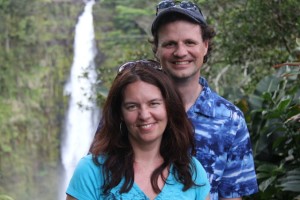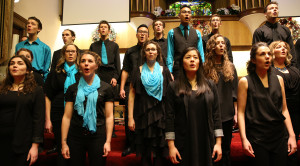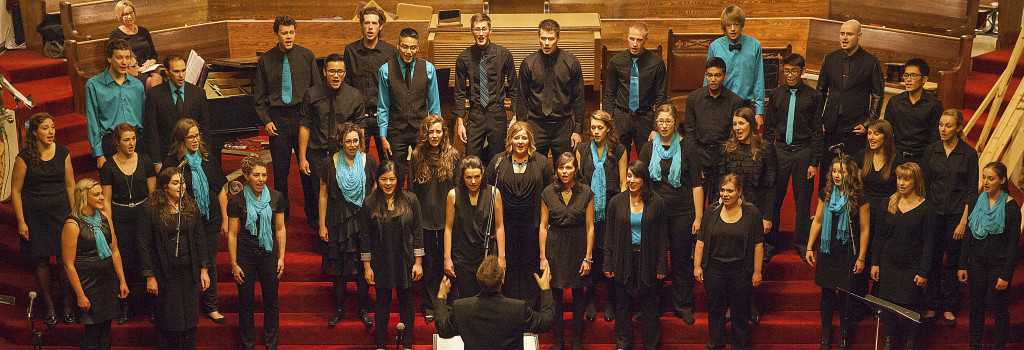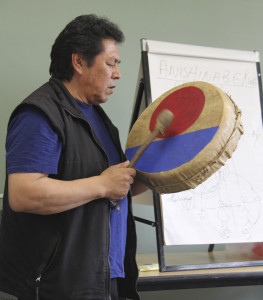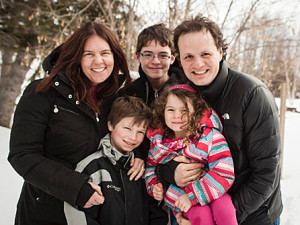Harmony through Harmony (HtH) is a community using music to make a difference. Founded in 2009 by Beth and Reid McLean Wiest, it has grown to include three ensembles with a total of 40-plus members who use their collective voices to raise funds and awareness about social justice issues. We recently had a wonderful, rambling conversation with Beth, and learned more about HtH.
Kolbe Times: Beth, can you explain the “mission” of HtH?
Beth McLean Wiest: Through music and the arts, HtH seeks to build community, expand worldviews, develop leaders and promote justice.
We believe each person is created in God’s image and has worth. We look for ways to discover the strengths of each individual in our community. Each member does a ‘strength finder’ assessment – and we look for ways we can affirm those strengths and thus help build the community in different ways. Some are ready to offer that part of themselves sooner than others. But as individuals are ready, we’ll find small tasks that align with their areas of strength.
Our core values are humility, compassion, courage, commitment and growth. It might sound ironic to have humility as our first core value, but we see humility as vulnerability and service and imitating Christ. We try to create a culture where we acknowledge that we are all broken, and we all fall short, and none of us are “better” than anyone else. That really plays into our leadership development. For our intake process, there is of course a vocal audition, but there is also a values-alignment interview. We look for a heart of service, and try to discover what people have had to overcome in their lives.
Kolbe Times: Tell us a little about your background, and how HtH began.
Beth McLean Wiest: First some background. My passion for music, and also for building community and developing leaders and promoting justice, have all come as a result of the investment of people in me.
My parents share those passions and nurtured them in me. I started playing piano when I was four, and singing when I was 13. I grew up in a church that was full of thoughtful, well-read, traveling disciples of Jesus. They were very concerned about getting past denominationalism and living out their faith Monday to Saturday, not just on Sunday. I thought it was normal to be a Christian who read with the newspaper in one hand and the Bible in the other. I also thought it was normal to wrestle with deep theological questions in community. What a blessing! My parents also taught me a lot about what was going on in the world. They owned a duplex, and one half of it was for us as a family to live in, and the other half was for missionaries home on furlough. So growing up I had great exposure to people who were doing a lot of travelling and ministry. I got bit with the travel bug early! I’ve now been to more than 35 countries, which certainly influences my perspectives and fuels my fire for promoting justice.
I learned that ‘making great music makes great people’ through two mentors in the Youth Singers of Calgary, CEO Shirl Penner and Principal Conductor Malcolm Edwards. Both of these individuals poured into me and allowed me to grow as a singer and performer and then later as a choral conductor and education director. I had a 15-year career there but counting my years as a singer spent 20 years under their influence.
I also spent five years each in two key communities that really shaped my faith and leadership: teaching at Menno Simons Christian School in Calgary and leading a women’s ministry at Centre Street Church called “Women of Heart”. God blessed me to be under the leadership of Christian women who were passionate about reproducing leaders. Both communities were pivotal in growing me in terms of servant and team leadership. My perspectives on ministry and mobilizing community toward a common purpose were really broadened. Being a lay leader in a mega-church is a great way to learn to respect and appreciate Church and organizational structure, authority and processes, among many other lessons!
So how did HtH begin? Well, back in May 2008, I was at the end of participating in the Leadership Calgary program, which takes applicants from business, government and not-for-profit sectors, and takes them on a year-long leadership learning journey together. I realized it was probably the most secular environment I’d ever been in. I was really challenged to see that many of my colleagues in the program were much more involved with humanitarian, advocacy and justice efforts than I was, even though as a Christian we are called to do that. It was fuel for a lot of thinking. One day I was literally on a treadmill at the gym when God gave me this vision of how all these different passions in my life could intersect – leadership and travel and justice and faith and education and music. I started to picture how they could all potentially work together. I left the gym and went to the clinic where Reid worked and dragged him away from his work to tell him my idea, because I knew I needed to articulate it to someone before I forgot. I think Reid kind of thought I was crazy, but over the next 18 months I put together focus groups and brainstormed with people I respected in each of the different areas of my passions. I needed to get the ideas out of my head, and see what shape they could take. But I knew I wasn’t supposed to move forward until Reid was ready to lead it with me.
Reid has always had a strong passion for music. He played piano and then trumpet in his school band. He was very influenced by the music of the Beatles, and in high school was part of an a cappella singing group. We met singing in the University of Alberta Mixed Chorus. We have sung together in ensembles ever since. He’s a family doctor, and he entered medical school in Calgary just as I graduated from university. He began singing and then directing an a cappella ensemble in Youth Singers of Calgary, OnCue, which he led for a decade. He still writes and arranges music for them. He’s immensely creative and arranges or composes a lot of the music we sing in HtH. He has really high artistic standards and makes singing and performing so fun! We now have three kids – two boys and a girl.
Basically, a lot of our ideas were born out of discontent. Because of our arts involvement, we had noticed an increasing shift that had to do with the “American Idol” culture. People in choirs seemed more and more interested in solo development; in other words, getting involved in choir so they could become a star. That didn’t sit well with either of us.
We see art and music as a way to praise God, and point others to Him, and be in awe of Him as our Creator. We wanted to rebel against that “American Idol” way of thinking – and go in the direction of re-claiming art and music for God’s glory.
Reid and I then went through what I would call a stripping season – we had a lot of loss to deal with. In June 2009, Reid and I went on a mission trip to South Africa with Centre Street Church. It was Reid’s first extended time in Africa, and my second time. Being in this music-infused culture, where music was a part of how they did everything, helped Reid to make sense of how music can transcend across boundaries and be used as a means and tool for a process, not just performance.
When we returned home, we got together with friends Torri Airhart and Becky Timmons, who are also both choral directors and who we periodically sang with. We began talking about our ideas, and together the four of us decided to just give it a go. So we all started praying about it and talking to people in our circles of influence. We had auditions, and people started checking us out.
We have had auditions every year since then, and our number of members and performances has steadily grown.
Kolbe Times: Our theme for this issue of Kolbe Times is “Inspirations and Intersections”. What have been some of the significant connections or collaborations that have happened for HtH in the past six years?
Beth McLean Wiest: It all started with one book: Not for Sale: The Return of the Global Slave Trade by David Batstone. The book explores forms of slavery in different nations around the world and we used it as our first book study during our very first ‘pilot-project’ year of HtH. To our surprise, we didn’t get past chapter one – which was about sexual exploitation in South East Asia. Many in our group were horrified, and wanted to learn more, so we spent that year looking at these issues. We sought out organizations that were addressing ending sexual exploitation and human trafficking to promote. We used our music and message to put on concerts to tell people about these organizations and our journey of learning.
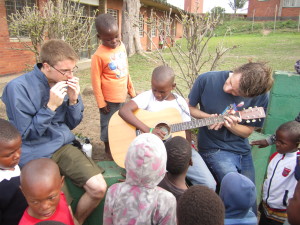
Members of HtH and children at Seed of Hope Community Development Centre, Bhekulwandle Township, South Africa
The next year we narrowed our exploration to the sexual exploitation of children and read Too Small to Ignore by Wess Stafford. That led to our whole group going to South Africa together during the summer of 2011. That trip was a turning point for our HtH community. It was definitely an “expanded world view” month. We saw and learned a lot about injustice and exploitation during our trip.
We call these expeditions our “Learning and Serving” trips – and the learning piece is key. There’s something about travel – when you come back home to your “normal”, you see it with different eyes. Your lens changes somehow.

HtH members at the Prince Mshiyeni Hospital in Umlazi Township, South Africa, painting the waiting room of the ward for children suffering sexual trauma.
After we returned home from South Africa, we studied two more books that continued to shape our community. The first was Humilitas: A Lost Key to Life, Love and Leadership by John Dixon. It discusses humility from an academic, research perspective and highlights the fact that humility didn’t become an esteemed virtue until the life of Jesus. Very interesting. The second book we studied is called Just Courage: God’s Great Expedition for the Restless Christian by Gary Haugen. He’s the founder of International Justice Mission, which is an organization that protects the poor from violence in the developing world. So reading these two books after our trip to South Africa, we began seeing Canada with new eyes. We started to think about what injustice in Canada looks like. This brought us face to face with our history, and how Settler Canadians have treated Aboriginal Canadians.
We connected with Pat Nixon, founder of the Mustard Seed Street Ministry. At the time, he was the Executive Director of T.H.E. StreetLevel Network which connects Canadian organizations involved in addressing poverty and building healthy communities.
StreetLevel Network took us under their umbrella, because we can bring the message into churches and connect people to the organizations that are on the ground doing the work. Pat, in turn, connected us to some incredible people in Winnipeg, including the leadership of Winnipeg Centre Vineyard Church there, who have a School of Justice and lots of transformational programs. We also connected with singer/songwriter Steve Bell, who introduced us to two First Nations leaders who had really impacted his thinking – Marcel Hardisty and Ovide Mercredi. We got to spend a few days sitting at the feet of these two men, listening and learning from them. Marcel then invited us up to Hollow Waters, an Ojibwe-speaking community north of Winnipeg. That was also a wonderful experience and honour. After we had spent time there, Marcel encouraged us to attend a Truth and Reconciliation Commission national event in Edmonton in March of 2014, again to listen and learn. That was a major eye-opening experience, and a privilege to be there.
In 2015, Reid and I had the opportunity to meet the president of Briercrest College and Seminary in Saskatchewan, Dr. Michael Pawelke. He introduced us to Kallie Wood, the Aboriginal Director and the initiatives that were going on in Briercrest, such as Aboriginal Awareness Week, which HtH was invited to attend. Kallie wants to ensure that the next generation of Christian leaders are well educated about Canada’s history. She invites First Nations leaders to come and teach. They talk about how they see Christianity and their own culture intersecting, and they facilitate dialogue. We were invited to sing and to share about our journey of learning. That was another remarkable experience.
It’s been really interesting to see the full circle of topics that we’ve explored, because many of our First Nations brothers and sisters experience sexual exploitation and abuse, and that was the issue we began to study in our very first year. So often we prefer to think that sexual exploitation only takes place on the other side of the world, but we came face to face with human trafficking right here in Canada. In many ways it was harder and more exhausting to travel around our own country and witness these issues, face to face. Singing has helped us process, express and share our experiences.
At the end of each year our leadership team meets, and we pray about what the Holy Spirit has been stirring within each of us and in our community. We talk about what direction that seems to be taking us. That’s how we’ve been continuing to discern what our focus is going to be each year. God has really been connecting the dots for us, and also opening doors.
Kolbe Times: What has your involvement with HtH meant for you personally?
Beth McLean Wiest: It’s been massively transformational for Reid and I, and for our three kids, too, because we haul them around. Our journey as Christians has certainly been deepened. What does it look like to be a biblical community with one another? What does it mean to read and reflect on the Scripture passages that you would rather skip over? What is love, and how can we love better?
William Wilberforce said, “You can choose to look the other way, but you can never say again that you did not know.” That’s been hugely true for us. When we read in Isaiah 61 and again in Luke 4:18 that we are to “proclaim good news to the poor, to bind up the brokenhearted, and to proclaim freedom for captives” – we have to ask ourselves, how are we being part of that? When we say that we are disciples of Jesus, how are we reflecting and bearing his image?
We need to learn to love our neighbor as we love ourselves – and part of learning to love yourself is discovering what your strengths are. You find out that ‘hey, this is something I can do!’ You start to think that maybe God has created you to shine this way. One way we can love God is to shine our light.
All of these insights have impacted Reid and I, as individuals and as a couple, and even how we parent and challenge our kids.
HtH has become our extended family, and it has radically impacted every part of our lives: our prayer life, our thirst for Scripture, our passion for Sabbath, our finances, what we’re modeling for others…it’s had a major impact.
Each of us has “mess” in our background of some kind. So in our HtH community, you never know what’s going to surface in any individual in any given year. But it’s been a privilege to dare to be vulnerable. It’s always a dance between humility and courage. It’s not comfortable, and it’s not always easy. Gary Haugen in his book Just Courage says that the cure for the restless church is to go and get uncomfortable. I would agree, from our experience. Risk-taking sure increases your faith! And the richness of discovering the “immeasurably more” that is promised in Ephesians 3:20 fans the flame to be willing to get messy…and see the beauty in it.
Harmony through Harmony sings For the Journey; song and lyrics by Steve Bell, choral arrangement by Reid McLean Wiest
All photos are courtesy of Harmony through Harmony.
Find them on Facebook or visit their website, where you can learn more about the HtH community and buy tickets for their upcoming “Immeasurably More” Fundraiser, featuring hors d’oeuvres, live music and story-telling. It takes place on March 18, 2016 at the Performing Arts Youth Centre in Calgary.


